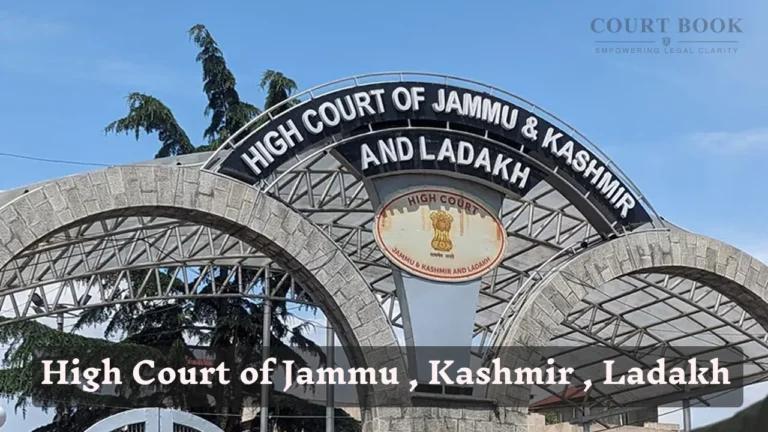The High Court of Jammu & Kashmir and Ladakh has upheld the deportation of two individuals who voluntarily acquired Pakistani citizenship, thereby losing their Indian citizenship under Section 9 of the Citizenship Act, 1955.
Justice Sindhu Sharma, while dismissing the long-pending petition filed in 1990, stated:
“The petitioners have acted in their own volition and acquired the citizenship of a foreign country. Their passports and the residential permit issued in their favour are cogent, unequivocal evidence of the fact that the petitioners are not citizens of India and, as such, orders to deport them were valid.”
Read also:- Kerala HC: Release Confiscated Goods on Fine Payment If Auction Not Held
The petitioners, Mohd Khalil Qazi and his wife Arifa Qazi, both born in Srinagar, had sought a writ from the court declaring the deportation orders issued against them as illegal and unconstitutional. They also requested a direction restraining authorities from deporting them from Jammu and Kashmir.
Case Background
Petitioner No. 1, born in 1945 in Srinagar, was stranded in Pakistan following the 1948 Indo-Pak war. Due to prolonged stay and circumstances beyond his control, he eventually acquired Pakistani citizenship. Petitioner No. 2, also born in Srinagar in 1962, married Petitioner No. 1 in Rawalpindi in 1986 and subsequently took Pakistani nationality.
Read also:- Delhi HC Slams Lawyer for Unprofessional VC Appearance, Emphasizes Need for Court Etiquette
In July 1988, the couple entered India with their minor son on valid Pakistani passports and were issued temporary residential permits. Although initially granted three 30-day visa extensions, their further request for stay and resumption of Indian citizenship was denied. A deportation order dated September 13, 1989, followed.
The petitioners contended that their Pakistani citizenship was involuntary and driven by historical circumstances. They argued their deportation violated Article 14 of the Constitution and principles of natural justice.
However, the respondents, represented by Senior AAG Mr. Mohsin Qadiri and DSGI Mr. T. M. Shamsi, submitted that both petitioners had voluntarily acquired Pakistani citizenship, which automatically resulted in termination of Indian citizenship under the law.
Read also:- Supreme Court Dismisses Lalit Modi's Plea Seeking Rs.10.65 Crore FEMA Penalty Indemnification from BCCI
Justice Sharma emphasized that:
“Voluntary acquisition of citizenship of another country by an Indian citizen results in the termination of his Indian citizenship.”
The Court referred to Article 9 of the Constitution and Section 9(1) of the Citizenship Act, reaffirming that the voluntary adoption of another country’s nationality ends Indian citizenship automatically.
“There is nothing on record to suggest that their request for grant of Indian citizenship has been accepted. They continue to reside in Srinagar without legal entitlement.”
Read also:- CJI BR Gavai: Supreme Court Belongs to All Judges, Not Just The Chief Justice
The Court also cited key precedents, including Izhar Ahmad Khan vs. Union of India (1962) and Union of India vs. Pranav Srinivasan (2024), which reiterated that Indian citizenship ends with the voluntary acquisition of foreign nationality.
The petitioners failed to produce any official acknowledgment or valid application proving their claim to Indian citizenship. The unsigned letters to the Chief Minister and Ministry of Home Affairs were deemed legally insufficient.
Finding no merit in the petition, the High Court dismissed the plea and upheld the deportation.
For Petitioners: Mr. Mohammad Altaf Khan, Advocate with Mr. Hashir Shafiq, Advocate
For Respondents: Mr. Mohsin Qadiri, Sr. AAG with Ms. Maha Majeed, Assisting Counsel Mr. T. M. Shamsi, DSGI with Ms. Sahila Nissar, Assisting Counsel.
Case Title: Mohd Khalil Qazi Vs State of J&K













